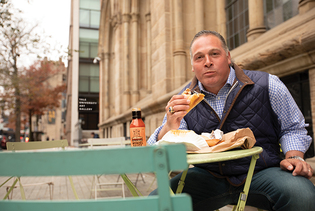
Bob Handelman
Eric Wenzel ’03 loved a certain sandwich--chicken with hot sauce--so much that New Haven’s Alpha Delta Pizza named it “the Wenzel.” After he left Yale, he went into equity trading. But there came a time when he wanted something very different.
View full image
The pandemic gave us a gift. Well, of sorts. A reminder of something we already know: we are all vulnerable; we must value what we have. Or, if we don’t value what we have, that we don’t “have unlimited time to change,” as life coach Kirsten Parker ’11MFA notes. Joanne Lipman ’83, author and former editor in chief of USA Today, says the pandemic made “the entire world rethink its future.” She did the same, hitting pause on her plans to write about the generational divide between women so she could write a book about reinvention.
Lipman’s book will address multiple kinds of reinvention, but Yale alums who have made significant career pivots—whether out of desire or misfortune—bear out her conclusion that people change in similar ways. They start by gathering information, sometimes before they are even aware they are planning a shift, then experience a period (possibly protracted) of struggle before they move. Often a break, chosen or enforced, allows ideas to coalesce. “When you are relaxed or distracted, your brain is working behind the scenes to put together disparate ideas in novel ways, without you realizing it is happening. That’s why you have great ideas in the shower or when you are exercising,” Lipman says.
The good news, according to Lipman? “Most of the reinvention stories you hear have happy endings.”
Here are some of them.
___________________________________________________________________
The Wenzel
When Eric Wenzel ’03 was at Yale, he so often ordered a chicken sandwich with hot sauce at Alpha Delta Pizza that “the Wenzel” became an item on the menu, with enough of a cult following that the sandwich is to more recent alums what the Mory’s drinking cup was to older generations: something you had to experience before graduation. After Yale, he worked in finance (as an equity trader). He didn’t so much choose to leave the field as realize, on parting ways with a former employer, that if he wanted to become a full-time entrepreneur, now was the time.
During his Wall Street days, he’d asked Alpha Delta Pizza, “If I can make a hot sauce better than what you have, will you use it on the Wenzel?” They’d agreed. So Wenzel trademarked his name and perfected a recipe. Later, when he left finance, what he’d thought would be an online retail hobby became his full-time business.
For a sandwich story that seems all fun, the tale has a tragic middle layer: in his senior year, Wenzel was seriously injured in a car accident that killed four others and left him in a coma. Now he honors those friends through Bulldogs Care Foundation, which dedicates a portion of Wenzel sauce profits toward programs for disadvantaged youth.
___________________________________________________________________
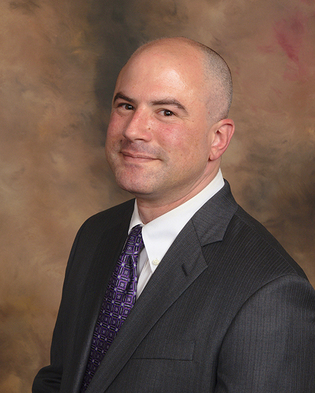
Rewriting the plan
Joshua Gitelson ’92 went into entertainment after college, focusing on scriptwriting and film editing, but mostly earning a living at the latter and notably spending the early aughts with the TV series The Practice. When he followed his wife to Oregon for her job in academic law, the distance from Los Angeles proved a professional disadvantage. Then his wife got a job in Virginia and subsequently Minnesota. This was no better for Gitelson’s film career, and his writing was beginning to frustrate him. He’d assented to a stay-at-home-dad role but felt he needed to consider plan B: which was law school. His wife was a lawyer, many people in his family were lawyers, and he’d spent eight years with a TV show about lawyers. So, at 40, he returned to law school. He worked for several years as a divorce lawyer; then his wife made yet another move for her career, this time to the middle of Pennsylvania, where she would be the dean of a law school.
Given her position, Gitelson’s income wasn’t essential for his family, so he kept tending to the children and household. But, as the cases that had most intrigued him in law school concerned assisted reproductive technology, he called one of the few lawyers in the area involved in both this and adoption law. As it happened, she was about to leave the country on a Fulbright and needed someone to cover adoption hearings while she was away. Gitelson signed on. Divorce law hadn’t suited him, but now he felt he was “trafficking in happiness.” He says, “I see people at the culmination of their most sacred aspirations and dreams, at the moment they become parents, and then I go home and try to make my family happy.”
The latest: Gitelson’s wife was hired as the dean of the Northwestern Pritzker School of Law, so yet another change is afoot. “I hope I can reproduce what I have now there,” Gitelson says. “I am aware of the fragility of contentment.”
___________________________________________________________________
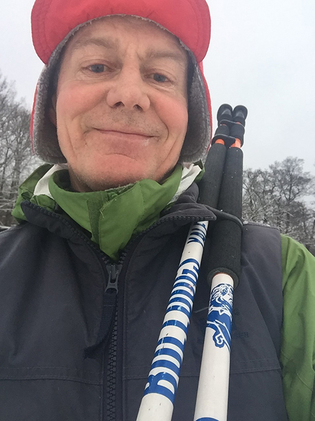
When change changes everything
At 36, Mats Carlsson ’81 was diagnosed with cervical dystonia, a painful condition that steadily worsened, until he was unable to properly move his head. Interactions with others became increasingly difficult. When sitting up, he had to stabilize his head with his hands. He credits the Swedish health care system, his wife’s employment, and the broadness of his Yale education with allowing him to leave his job teaching Swedish for work he could do lying down: investing in biotech firms.
“It is hard for Yalies to face a condition where they may have to lose their dignity by taking a lesser job, even as they see classmates go into greater and greater careers,” he says. Yet five years ago, when brain stimulation surgery made it possible for him to reconsider teaching, he decided that “the excitement of assisting companies in bringing new drugs to the market (and some day trading) makes my ‘new job’ one that I will keep until I die.”
___________________________________________________________________
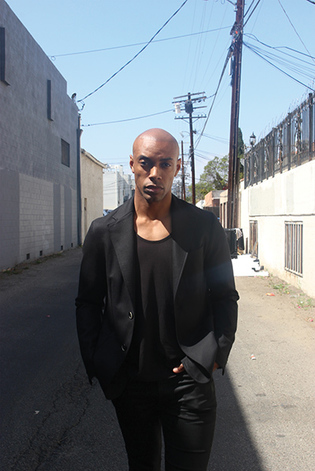
Dorian “Scottie” Wilson
Casey Gerald ’09 followed up his Harvard MBA by cofounding the nonprofit MBAs Across America, a “domestic peace corps for business students.” But it was through writing that he found his sense of purpose.
View full image
“What it means to live”
Though he was a finalist for the Rhodes Scholarship, Casey Gerald ’09 was enough of an innocent in some areas that, in his sophomore year at Yale, when a football teammate told him he should become an investment banker, Gerald said, “What’s that?”
“People who make $60,000 a year,” the upperclassman said.
The figure persuaded. After all, Gerald’s grandmother (who was, at times, his primary caregiver) made $60 a day cleaning houses. But two college summers with Lehman Brothers wasn’t an auspicious start. So, after three years in DC, Dallas and, New York, Gerald went to Harvard Business School. With three HBS classmates, including Amaris Singer ’07, a “let’s go on a road trip” lark turned into a purpose. They cofounded the nonprofit MBAs Across America, which Gerald describes as “a domestic Peace Corps for business students.” The goal was to have MBAs use their education to aid small businesses in underserved communities.
Gerald was impressed by what he found across the country: entrepreneurs building successful mission-driven businesses, despite long odds. But, after only two years, he started to question his organization’s theory of change. “Not,” he clarifies, “if it would work. Put four Harvard MBAs in a café in Arkansas, and a business will get better, but it felt like we were doing dialysis on a country that needed a kidney transplant.” He felt both enraged by the structural inequities he saw around the country and as if he were contributing to those inequities by “substituting hopeful stories”—like his own personal story, as a poor Black boy from Oak Cliff, Texas, who had flourished at Ivy League schools and beyond—“for justice.”
In early 2016, Gerald, already drawing substantial media attention for MBAs Across America, was invited to give a TED Talk. He now describes that speech as the most elaborate resignation letter ever. Funny, moving, and impassioned, the talk went viral, the script later becoming part of a presentation Gerald gave to open for Barack Obama at SXSW. But the TED talk was a turning point; Gerald walked away from all he’d achieved to date in order to write.
“Publishing is the only industry where they will pay you to investigate your own problems,” Gerald says. Though his gifts as speaker at a Harvard Business School Class Day had audience members encouraging him to write, the author Anand Giridharadas did the actual convincing.
In 2016, Gerald moved to Austin to begin a memoir. Later that year, he learned that a dear friend—a Yale graduate, one year his junior but with a background similar to his—had committed suicide. The two men had been in touch only a month earlier, and all had seemed fine then.
Writing the memoir that would later become There Will Be No Miracles Here (Riverhead), Gerald felt blocked when he had to describe his Yale years. So he took a nap—“aided by some bourbon,” he notes. His friend came to him in a dream and said, “You know, Casey, we did a lot of things we wouldn’t advise anyone we loved to do.” Gerald woke up and put the line in the book. After, he felt his book had two narrative lines, one that clearly articulated what his life had been and another that was a work of imagination, addressed to, as he puts it, “what it means to live, to truly live, to be whole, a better friend, a better lover, instead of being great, as we are conditioned to be at places like Yale.”
___________________________________________________________________
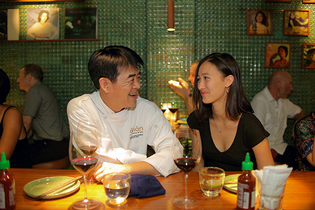
Peter Cu’ò’ng Franklin ’86 with his daughter Zoe at his restaurant Anan Saigon.
View full image
“What now?”
At multiple points in his life, Peter Cu’ò’ng Franklin ’86 has had to stop himself and say, “OK, Peter, what are you going to do now?” The first time was after he graduated from Yale and realized that, despite his previous plans, he didn’t really want to study medicine. So he did what so many of his classmates did; he went to work for Morgan Stanley. Over the next 20 years, the job took him to New York, London, and Hong Kong, and he was fired . . . twice. But he always bounced back, a talent he attributes to his familiarity with abrupt life changes, having left Vietnam as a teenage refugee in 1975, one day before the collapse of South Vietnam. He was subsequently adopted by a US Navy chaplain.
Still, in 2010, after that second firing, another “OK, Peter, what are you going to do now?” made him choose to study cooking at the Cordon Bleu branch in Bangkok. After a year, he asked himself the question yet again and answered with an application for a PhD in anthropology at the Chinese University of Hong Kong. He figured he’d study food culture.
“And guess what?” he says. “They rejected me.”
In hindsight, he suspects he would not have made a good academic. Still, he returned to Hong Kong, which has a tradition of “unofficial kitchens,” he says. These are essentially establishments in private homes that are relatively easy to open and come with little risk. A friend told him about an available space in a dilapidated building in Lan Kwai Fong, the dining and entertainment district in Hong Kong’s center. Franklin took it and began to discover his own cooking style. The first endeavor segued into others. Eventually, Franklin opened three restaurants in Hong Kong, a seven-year stint that ended, he reports, when he divorced, sold his restaurants, put his belongings in storage, and went to Ho Chi Minh City with only a backpack. It was another tabula rasa moment.
And then yet another phone call from a friend, this time telling him about a space in a wet market in Ho Chi Minh City. Others told him it was a bad idea, given that the country has no shortage of great restaurants. But he persisted, and since 2017, he has been the chef of Anan Saigon, which was listed by Asia’s 50 Best Restaurants 2021 as the number one restaurant in Vietnam. “That is,” Franklin explains, “a little like the Oscars of the food world.” As for the “What now?” refrain that has accompanied him throughout his adult life, Franklin says, “I have learned to accept the question is part of the life journey. There is no final answer.”
___________________________________________________________________
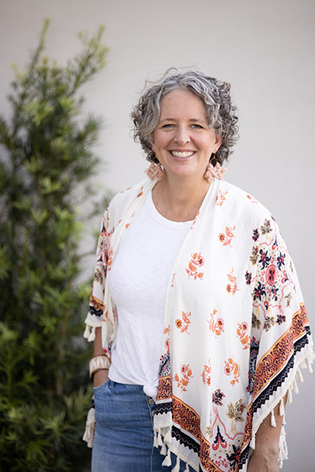
Crafting a different future
Anne Weil ’94 was sitting in a windowless conference room in San Antonio, Texas, under flickering lights, doing what she did so well: sealing a real estate deal. She’d been in banking and real estate finance virtually since college, and she was good at it—detail-oriented and hardworking, even though she didn’t have the passion others had for this particular moment. In fact, she was thinking she didn’t want to spend her life this way.
Later, she tried other things—like a career break to study landscape architecture—but she kept returning to real estate asset management and investment analysis. Then, in 2012, 13 years after that Texas day, her husband was hired by the Baltimore Ravens. He said, “I have my dream job. You should pursue yours.”
Two years earlier, as she had always liked making and designing objects, she had begun flaxandtwine.com, a blog devoted to crafts. She loved every aspect of the blog—taking the photographs, writing project instructions, giving people, as she says, “time for their own creative life.” Now the blog was going to become a full-time endeavor, with advertisers, sponsored content, and an online shop with DIY kits for stylish baskets, bracelets, and other objects that are, as she puts it, “elevated to a modern aesthetic” and “not your grandmother’s crafts.”
It still took her nearly a year to close down her real estate career, but on the day she sold her final property, a publisher called to ask her to write a book. She found herself an agent and subsequently published Knitting Without Needles and Weaving Within Reach.
As much as she adores what she is doing, Weil realizes that she had been anxious about her performance before, often asking herself if she had enough information, if she had done enough work, and if people liked what she did. Though she clearly has been successful in both of her careers, she still pesters herself with such questions, but now she does so, she says, with “joy and excitement.”
___________________________________________________________________
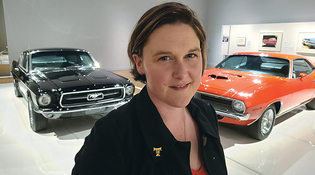
Matt Standish/Detroit Institute of Arts
Margaret Aiken ’04, shown here at the Detroit Institute of Arts, found that running a museum mostly involved raising funds and attending to crises.
View full image
On the road to Ford
When she was a child visiting the Cranbrook Institute of Science, Margaret Aiken ’04 passed an older gentleman busy with a magnifying glass, tweezers, and a shoebox.
“What are you doing?” she asked.
“Reconstructing a fossilized turtle shell,” he answered. “Do you want to help?”
She did, and for much of her professional life, she kept helping, whether in science, art, or history museums, advancing until she became the executive director of Michigan’s Port Huron Museum of Arts and History, in the very town where she’d been born. Her goal? Inspire curiosity. Instead she raised funds and attended to crises. After five months, she felt burnt out, as if she’d come on too strong, arriving without enough understanding of her community, despite her relationship to it. So she gave notice.
With no idea what to do next, she started cooking at a restaurant, though having attended both boarding school and Yale, “the most cooking I’d done was scrambling eggs,” she claims. Still, the job allowed her time to think. Three of her brothers were in technology, so she knew the field was virtually recession-proof. She took some classes, including courses that introduced her to user experience design. A Chicago boot camp session provided even more expertise. “This was the perfect marriage of what I had been doing and what I wanted to get into,” she says. She landed her first job, in product design, with the FordPass app, on March 13, 2020, with a start date of April 1—the joke being very much on her, given that the pandemic kept pushing the true starting date forward. Finally, in mid-November 2020, she (remotely) began a new job in a new industry. “I’ve learned something few people are ready to admit,” she says, “which is the start of anything is uncomfortable, but if you persist through the discomfort and have humility and a growth mindset, you get to the point where you don’t feel so uncomfortable anymore.”
___________________________________________________________________
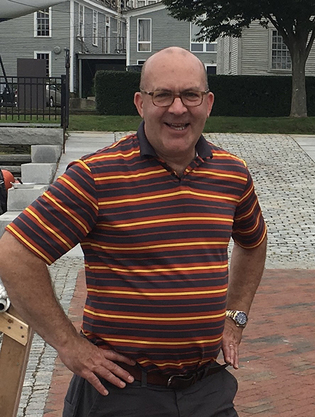
A tech guy picks print
Ray Small ’82 spent most of his career in the information technology industry, living both in the United States and abroad. At 55, while on vacation with friends, he saw an article in the Sunday New York Times about the Hardwick Gazette, a rural Vermont newspaper that was running a “Write an essay. Win a newspaper” contest. So Small wrote an essay—on a 1951 typewriter, to look the part—about what happens when a local paper dies.
He didn’t win the contest.
No one did.
The terms of the giveaway were that at least 700 people had to enter the contest (and pay the entry fee) for the paper to change hands. But Small was still interested. He had already driven up to the northern Vermont locale to investigate the prospect, and after some negotiation, he and his wife bought the paper from his predecessor. He knew his arrival could have been a disaster, with “people not appreciating some idiot coming in and running their local paper,” he says, but instead he has found the community warm, and he’s enjoyed learning about federal financing, road graders, the Kiwanis, and other matters. “It’s like living the Newhart show, albeit without a laugh track,” he jokes, though his purchase has its altogether serious purpose of keeping journalism alive, educating the electorate, and supporting democracy.
___________________________________________________________________
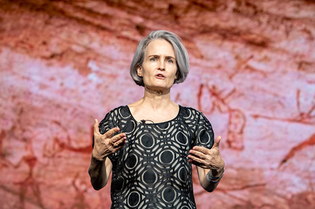
An activist shifts gears
Miranda Massie’s years at Yale were brief—a quick stop for a ’92MA in American Studies—before she realized that law, and specifically civil rights impact litigation with a focus on racial justice, was where her heart was. After attending NYU School of Law, she spent ten years in Detroit with a small firm that allowed her to focus on issues of racial justice and education. She prized the work, but around 2005 and 2006, she started to “recognize the significance of the environment as a site of civil rights and inequality,” she says. That belief, and a desire to be near her parents, brought her back to New York. She continued to practice public interest law, but post–Hurricane Sandy, the idea of a climate museum popped into her head.
She googled the phrase and learned there was no such museum in the United States at the time and only one in the world. So with a liquidated retirement account—“My mom freaked out,” Massie says—the Climate Museum that she now directs has been offering programming and exhibitions around New York City, as it waits to acquire a permanent home. Massie perceives the museum as solutions-based, an activist cultural institution, geared to helping people understand how to affect change. Considering the scale of the problem, Massie notes, “we know we need an all-hands-on-deck approach.”
___________________________________________________________________
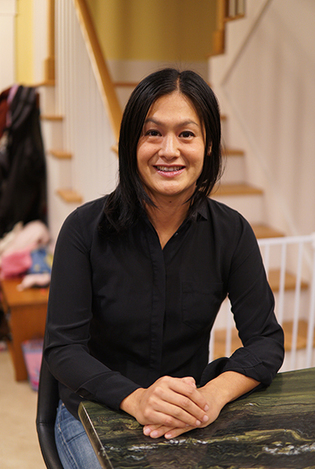
A calling in public health
Ingrid Chen ’04 always felt money was scarce during her childhood. Her parents were Taiwanese immigrants who’d attended Yale, and she felt pressure to do the same. After college, she became a synthetic chemist, but her biotech jobs working on anticancer drugs felt dissatisfying. With both male roommates and male colleagues, she would often go a whole week without talking to a single woman. At the lab, tasks that others did not want to do fell to her. She thought a PhD would earn her more respect, but she graduated from Berkeley into the recession and postdoctoral fellowships rather than lucrative employment.
Then, when she was 29, a high school friend drowned. The tragedy was something like a wake-up call. “I realized I was working really hard for a future I envisioned, and I wasn’t enjoying any of it,” she says. Given the 80-hour weeks, the preponderantly male colleagues, and the occupational hazards of toxic, carcinogenic, and flammable lab substances, she wanted a change. She started reading about public health, an old interest from childhood years spent in Libya and the United Arab Emirates, as well as a college summer in Kenya doing malaria tests. A global health science master’s program would be expensive, “but money was the whole reason I chased something I didn’t want.” So she put her fears aside, attended the program, and has been active in public health and global health policy regarding malaria ever since, working closely with the World Health Organization. She is now an assistant professor of epidemiology and biostatistics at the University of California–San Francisco. Her income is higher than when she was a chemist, and she says that her “financial anxieties dissolved, because this sorted itself out naturally.”
___________________________________________________________________
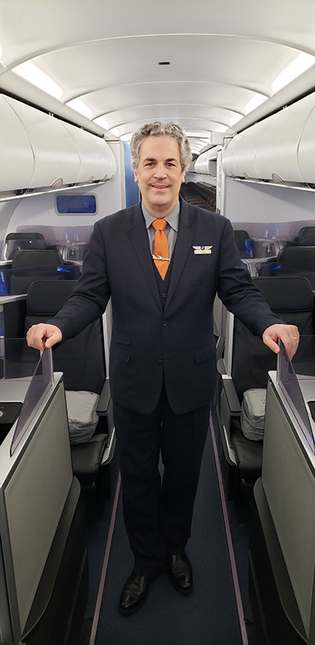
In flight
After Yale, Christopher Handy ’83 used his art history degree to sell prints in New York art galleries, but he never considered himself a salesman—rather, somebody who appreciated art and could talk about it. When he and his wife moved to Portland, Maine, to raise their child, he didn’t have a job but eventually found work with Unum, the life insurance company, in the investment mortgage division. He also returned to acting, which had been a passion at Yale. He started in community theater, and while mergers were afoot at Unum, he picked up acting jobs in more-established venues and summer stock, and did voiceover work and film commercials. Even so, the theater income wasn’t sufficient. He returned to banking, thinking the acting would at least make his day job more bearable.
In 2006, he was performing in the two-person play Love Letters when his costar (a veteran flight attendant at Delta) said, apropos of who-knows-what, “You would make a good flight attendant.” Handy had never considered the possibility, but now he did. He liked to travel. Aviation had been an interest since boyhood. He’d even begun studying to get a pilot’s license when he lived in New York. He started looking and eventually landed a position at jetBlue. Now, he says, “As a lead flight attendant, I get to use my theatrical and voiceover talent to make my cabin safety announcements pleasant—and even entertaining! After all, airline customers are a captive audience; why not make it fun for them? But even more than that, I have discovered I enjoy lending a hand and making someone else’s day just a little more pleasant.”
___________________________________________________________________
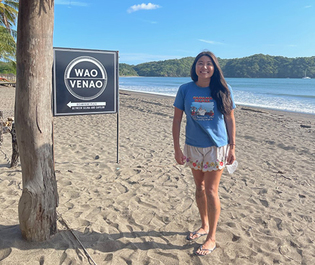
Call of the isle
Aya Osuga Andrews ’05 was with Lehman Brothers in Tokyo when the firm went bankrupt and was acquired by Nomura. Though she stayed with Nomura for nearly a decade, the work hours were difficult, ditto the institutional oversight, which made even minor personal phone calls complicated. Digitalization and artificial intelligence were shrinking her commissions. Andrew’s boyfriend (now husband) was facing similar issues as a sales trader at a different company, so he quit to travel, eventually driving down the coast of Panama, as a client had told him the country had investment potential. He landed in Playa Venao, a tiny beach town that wrapped a horseshoe-shaped bay and was surrounded by hills, reminding him of Hawaii’s Big Isle, where he’d grown up. At the time, only 200 people lived in Playa Venao, and he wanted to join them.
Andrews had planned to stay in finance a few more years, but the work/life balance in Tokyo felt untenable if she wanted a family, so nine years ago, she moved to Playa Venao to assist in overseeing the 800-plus acres her partner subsequently acquired for development. Meanwhile, she started the small Manglares Discovery School. She says she still feels “like a workaholic, but all my efforts are accretive, and my kids are growing up like modern-day Tom Sawyers. I wouldn’t trade it in for the world.”
___________________________________________________________________
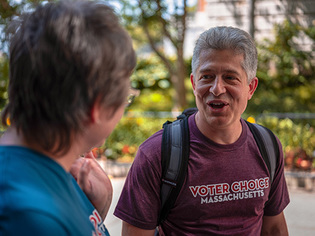
Applied philosphy
A philosophy major wasn’t “a brilliant career move,” Nathan Lockwood ’93 admits, but even so, he spent over 25 years in software engineering, including as a successful computer programmer, before he decided to return to the activism of his student years, when he’d led Yale’s Amnesty International chapter. His reformist desires came to a head with the 2016 election and a belief that Democrats and Republicans, however well-intentioned, were incapable of the consensus necessary to run the country successfully. Though the Massachusetts 2020 Ranked-Choice Voting Initiative that he got involved with failed, the 1.5 million “yes” votes inspired Lockwood to keep trying. Now, he is the executive director of Rank the Vote, which he cofounded to help grassroots groups organize for ranked choice in their states. The job is “the single most important thing I could be doing,” he says.
___________________________________________________________________
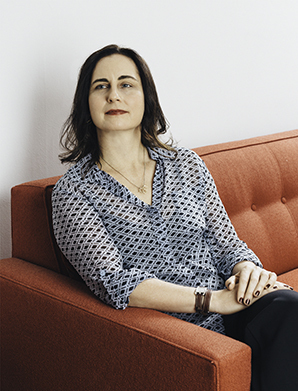
How did I get here?
Early in her professional life, Danielle Spencer ’96 worked briefly for photographer Nan Goldin, taught art, and studied critical theory. “If you asked me what this was a means to,” she admits, “I wouldn’t have been able to answer. I was just following my interests.” Then she landed an enviable job, as David Byrne’s art director. She worked as producer, graphic designer, and collaborator on the polymath’s eclectic, and frequently transnational, projects, assisting with art installations, album covers, books, and more. As much as she loved the work, after a decade she felt she needed to find her own voice. When she heard about Columbia University’s Narrative Medicine program, she was intrigued. Spencer had always appreciated that “DB,” as she calls him, “never wanted to repeat himself and always wanted to synthesize different disciplines.” The Columbia program was similarly interdisciplinary. Now, Spencer directs the program she once attended, helping others consider how literature can inform medical education.
___________________________________________________________________
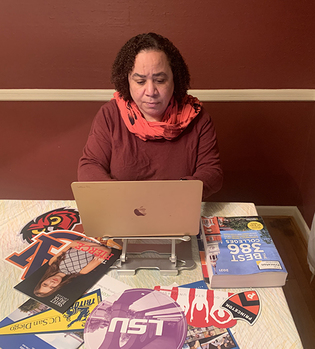
College counseling
Nancy Edwards ’88 spent 18 years with an intellectual-property law firm, when a new chief operatoring officer joined the firm and eliminated all the coordinator positions, including her own as litigation coordinator. This left her, in her 50s, both overqualified for many legal jobs and underqualified for others. She was in shock but took a survey that indicated possible career interests, and one was college counseling. As it happened, she had been on the periphery of college admissions, as she had represented Yale at college fairs, encouraging minority applicants, and also working pro bono with an organization to assist first-generation, high-achieving, low-income students. Not much of a self-marketer, at first she worried about getting clients, but plenty of people have found her through word of mouth. The job “feels great,” she says. “You bring people in and then you help them.”
 loading
loading














8 comments
-

Forrest Lammiman, 9:35am January 14 2022 |  Flag as inappropriate
Flag as inappropriate
-

Victoria R., 11:56am January 16 2022 |  Flag as inappropriate
Flag as inappropriate
-

Debra, 8:00pm January 16 2022 |  Flag as inappropriate
Flag as inappropriate
-

Michele Anderson, 4:36pm January 17 2022 |  Flag as inappropriate
Flag as inappropriate
-

Toby Gardner, 10:54pm January 17 2022 |  Flag as inappropriate
Flag as inappropriate
-

Allyson Young, 11:25am January 18 2022 |  Flag as inappropriate
Flag as inappropriate
-

Charles Stewart, 3:33pm January 28 2022 |  Flag as inappropriate
Flag as inappropriate
-

Bob Becker, 5:41pm February 18 2022 |  Flag as inappropriate
Flag as inappropriate
The comment period has expired.All interesting lives. I did much the same. I first got my Ph.D. from Yale in Religious Studies, and taught in small liberal arts colleges for a few years. I quickly realized--rather too late--that the pay would never suffice and that my wife and I were city people, not fit for small town venues. So at 37 I went back to law school at Iowa. My wife put me through. I soon loved the law, and made my career in commercial bankruptcy and litigation matters. To my own surprise, I fairly soon learned to bring in business and kept doing so for decades. My wife told me she always thought I could do that. How very loving she is, and how lucky I am. I enjoyed all my almost 40 years in the law: days in court, writing briefs and chapter 11 plans; negotiating and strategizing. It has been a great ride, and has allowed me to pay back my wife and help our daughter. Forrest Lammiman
For an article that has an almost equal representation of men and women in the offered “case studies”, it is disturbing how many examples one has to scroll through to find a description of a woman who has achieved a successful career change (five total). The editorial staff may want to check their unintentional gender bias. Comes across as the only laudable stories are those about high achieving men.
Victoria-As the author, I would like to push back on your comment. Fourteen profiles here. Half are female and all seven of these women had successful career changes. Plus mentioned one woman in intro who had a successful career change and referenced a female expert in intro, so puzzled by what strikes you as unintentional gender bias. Debra
Hm...I went from law (A-track law, btw) to food to journalism (ending up as a newspaper editor). Now I am a freelance book editor -- something I had always wanted to do, but it made no money. Life is interesting when one no longer cares about clinging to the A track.
Wonderful piece--very inspiring and well written. (But, jeez, poor Eric Wenzel! Wasn't there a picture taken of him without his mouth full of a sandwich bite?)
These are all great stories, such interesting paths. They have made me realize that I am not necessarily "stuck" in my industry.
Victoria, I think you need to reconsider your definition of a "successful career change".
A stimulating read and interesting to compare how/when/why people made their pivot. So many Yale grads with creative talent or entrepreneurial ideas end up choosing well-established career paths in part because they have thrived within structured academic settings and it’s convenient to stay on a track. Based on my experience as a student, and then as an employer of Yale grads, I believe that Yale and Career Services could do more to encourage and stimulate a broader set of post-college opportunities. In my case, it wasn’t until after 19 years in finance that I made my pivot — I wish it had happened sooner.
I immensely enjoyed these success stories. My Yale friends thought I was punking them when I shared I had retired from consulting and earned my M.D. at age 55. I credit my Yale experience for helping me “repot” myself and equipping me to be better fitted for a useful life.